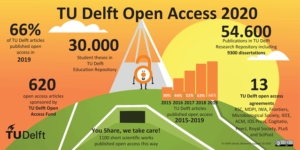Open access as a movement has been around since the Berlin Declaration on Open Access to Knowledge in 2003. For a long time, however, it remained with good intentions and the successes remained modest. Ten years ago, barely 10% of the articles in the Netherlands and at the TU Delft were published as open access. The publishing industry is conservative and very profitable, making radical changes very difficult to implement.
 In the past ten years, coordinated efforts between funders, politicians, librarians and scientists have slowly but surely brought positive changes. Commercial publishers were pressured to use more open publishing models. The Internet enabled many scientists to share their work in pre-prints, institutional repositories and social networks such as ResearchGate. Thanks to a well thought-out infrastructure, services to researchers and agreements with publishers, open access is now firmly anchored within TU Delft. . In the publication year 2019, more than 66% of the scientific articles and more than 50% of the conference papers of Delft authors were published open access.
In the past ten years, coordinated efforts between funders, politicians, librarians and scientists have slowly but surely brought positive changes. Commercial publishers were pressured to use more open publishing models. The Internet enabled many scientists to share their work in pre-prints, institutional repositories and social networks such as ResearchGate. Thanks to a well thought-out infrastructure, services to researchers and agreements with publishers, open access is now firmly anchored within TU Delft. . In the publication year 2019, more than 66% of the scientific articles and more than 50% of the conference papers of Delft authors were published open access.
Open Access at TU Delft is part of a holistic approach towards building a culture of open knowledge. It forms a building block of the TU Delft Open Science program 2020-2024, which also includes TU Delft’s own publishing platform TU Delft OPEN Publishing. As of 2021, the funders who have endorsed Plan S (e.g. NWO, the European Commission), will implement strong open access publishing mandates. It is expected that open access will become increasingly important for scientists with a grant in their pockets. Scientists will have to pay more attention to where they will aim to publish as more publishers will be adapting their existing models. For more information on how Plan S and open access will affect the publishing of your research please visit this website.
Are you interested in this topic? Visit our blog again tomorrow! During the open access week (19-25 October 2020) we’ll deliver to you a morning–coffee reading every day.
